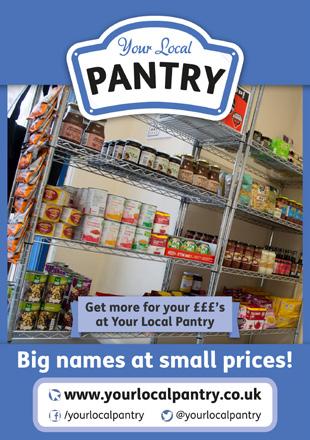
3 minute read
Features
from Oremus March 2021
FOOD, GLORIOUS FOOD
What’s in the Pantry?
Church Action on Poverty
Neighbourhood food pantries can be at the heart of Britain's pandemic recovery, strengthening communities, improving health, and loosening the grip of poverty. The Your Local Pantry network has issued a report, charting the difference its pantries are making to members and their communities. In the past year, the number of pantries has risen from 14 to 42. More than 6,800 UK households, including almost 12,000 adults and 8,000 children, are now members.
Niall Cooper, director of Church Action on Poverty, which runs the network, said: ‘The rapid growth of the Your Local Pantry network offers a beacon of hope, demonstrating that communities can be at the forefront of developing practical and sustainable long-term responses to the pandemic. The network has grown exponentially and is rapidly becoming a key component of community-led recovery across the country. It could easily double in size again in the next two years. Of course, we need urgent action by Governments and employers to ensure households have access to secure and adequate incomes, free from the grip of poverty. But at the same time as pressing for such action, our goal over the next five to ten years is to help develop a national network of Local Pantries, building dignity, choice and hope at all times for thousands more people. They can help drive the rebuilding of neighbourhoods, and ultimately strengthen the voice of communities who are too frequently overlooked, neglected, or stigmatised’.
Gillian Oliver, a Your Local Pantry Development Worker, notes that: ‘When people get in touch about starting a Pantry, they usually have experience of charitable food projects of one kind or another. In 2020 many were Councils, grappling with food provision in a national emergency and looking for something new that local people can lead, something that isn't constantly grant-seeking but which pays its own way. And that's what a Pantry is - it's not charity - it's not a food bank. It's a food club that helps your money go further. You can join without being referred and remain a member for as long as you wish’.
The impact report, Dignity, Choice, Hope is based on interviews and surveys with 490 members from 19 pantries, and on stock data and volunteer and member stories. Findings are that:
95% of members had saved money 70% feel more connected to their local community 69% say their physical health has improved 76% say membership has improved their mental health 57% say they have made new friends 59% say they now eat less processed food 54% say they now eat more fresh fruit & veg
One member at St Andrew's Pantry in Liverpool reported that: ‘The Pantry is helping me a lot financially to make fresh healthy meals, leaving me more able to pay my bills, which was something I was struggling to do. I was eating a lot of frozen food and struggling to put gas and electricity in my meter. Thanks to the Pantry this is no longer an issue’, whilst another in Birmingham said: ‘I feel happy and don't feel ashamed going in here, or feel like I'm being judged. Everyone is treated the same’. The past year's growth has been fastest in Liverpool, where the St Andrew's Community Partnership has opened ten new pantries with total membership of more than 2,200, with rapid growth also in the West Midlands, Edinburgh, Cardiff and London, as well as Lowestoft, Dover, Salisbury and Dorset.
Members join pantries by paying a small weekly subscription (typically around £5), which entitles them to £20 or more a week of groceries, meaning members can save more than £780 a year. Stock comes through FareShare and local suppliers, and a key principle of pantries is that people have access to a good choice of high-quality food. The Your Local Pantry model was pioneered by Stockport Homes in 2013, and developed into a national network by Church Action on Poverty. Elena Vacca, Community Food Officer at Foundations Stockport (part of Stockport Homes Group), said: ‘I'm glad that the model we created has been rolled out across the UK by Church Action Poverty and therefore it's had the chance to help support more people throughout the pandemic in terms of accessing food but also in tackling social isolation. In Stockport, residents have been grateful to get access to the food they need with dignity, providing a hand up rather than a hand out’.











